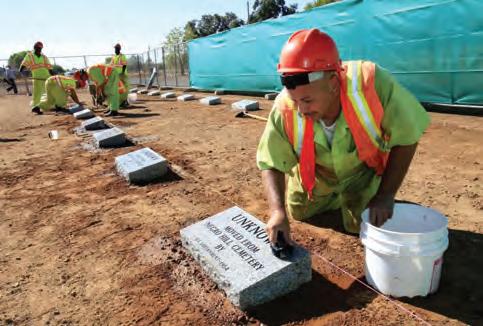
2 minute read
California and Nevada may ban forced prison labor, servitude
Lawmakers in Nevada and California are advancing legislation to remove “involuntary servitude” from their states’ constitutions, a move that follows four states’ bans on forced labor that passed in ballot measures last fall. The goal of these proposals is to remove exceptions from the states’ constitutions that allow forced labor as criminal punishment. The efforts come amid a growing push among some states to scrub outdated, century-old language from their state constitutions. Last fall, voters approved similar ballot measures in Alabama, Oregon, Tennessee and Vermont.

Advertisement
About a dozen states are pushing this year to get rid of the involuntary servitude exceptions, according to the Abolish Slavery National Network. Some advocates said this has major legal implications today, particularly in litigation related to prison labor pay and conditions.
It’s not uncommon for prisoners in California, Nevada and other states to be paid less than $1 an hour to fight fires, clean prison cells, make license plates or do yardwork at cemeteries.
Samuel Brown, who was formerly incarcerated with a life sentence, helped author an anti-involuntary servitude amendment in California last year. He said incarcerated people can be forced to do work that is unsafe and puts their health at risk. Even more, he described how terrified he was when he had to disinfect jail cells after someone tested positive for
COVID-19. Brown said the amendment that is being reintroduced this year is long overdue.
“We have an opportunity to stamp it out once and for all. We’re not going to stop until we get it done,” he said. The language allowing in-
The ruling -- which would come from Judge Roger Benitez -- is believed to be imminent, according to Kostas Moros, a lawyer representing the California Rifle and Pistol Association. Moros said the final response briefs in the cases are due on Tuesday and Benitez could rule any time after that.
Advocates on both sides of the gun debate issue say they expect Benitez, who is known for ruling against California's gun control laws, will decide to strike down the three-decades long law.
"We would see this as a win," Rick Travis, the legislative director for the California Rifle and Pistol Association, a gun rights lobbying group.
Still, Travis said the decision is unlikely to lead to any immediate change in the sale of guns in California.
"Californians have this idea that when they hear the news, that this is going to change overnight. This isn't," Travis said. "No matter what happens either way with the decision nothing's going to change for the foreseeable future. And when I say that, I mean for years."
Travis said the decision will be appealed to the 9th Circuit Superior Court and from there, potentially, all the way up to the Supreme Court.
Governor Newsom warned about the likely ruling earlier this month while announcing new gun control legislation after the Half Moon Bay and Monte -
See WEAPONS on page B4
Democratic governors form alliance on abortion rights
BILL BARROW AND GEOFF MULVIHILL | CONTRIBUTED
Democratic governors in 20 states are launching a network intended to strengthen abortion access in the wake of the U.S. Supreme Court’s decision nixing a woman’s constitutional right to end a pregnancy and instead shifting regulatory powers over the procedure to state governments.
Organizers, led by California Gov. Gavin Newsom, described the Reproductive Freedom Alliance as a way for governors and their staffs to share best practices and affirm abortion rights for the approximately 170 million Americans who live in the consortium’s footprint — and even ensuring services for the remainder of U.S. resi - dents who live in states with more restrictive laws.
“We can all coalesce,” New Mexico Gov. Michelle Lujan Grisham said in an interview ahead of a Tuesday announcement. She added that the court’s Dobbs decision that ended a national right to abortion “horrified” and put pressure on governors to act. “This is leveraging our strengths ... to have more of a national voice.”
That includes, organizers said, sharing model statutory language and executive orders protecting abortion access, ways to protect abortion providers from prosecution, strat -
See ABORTION on page B4










